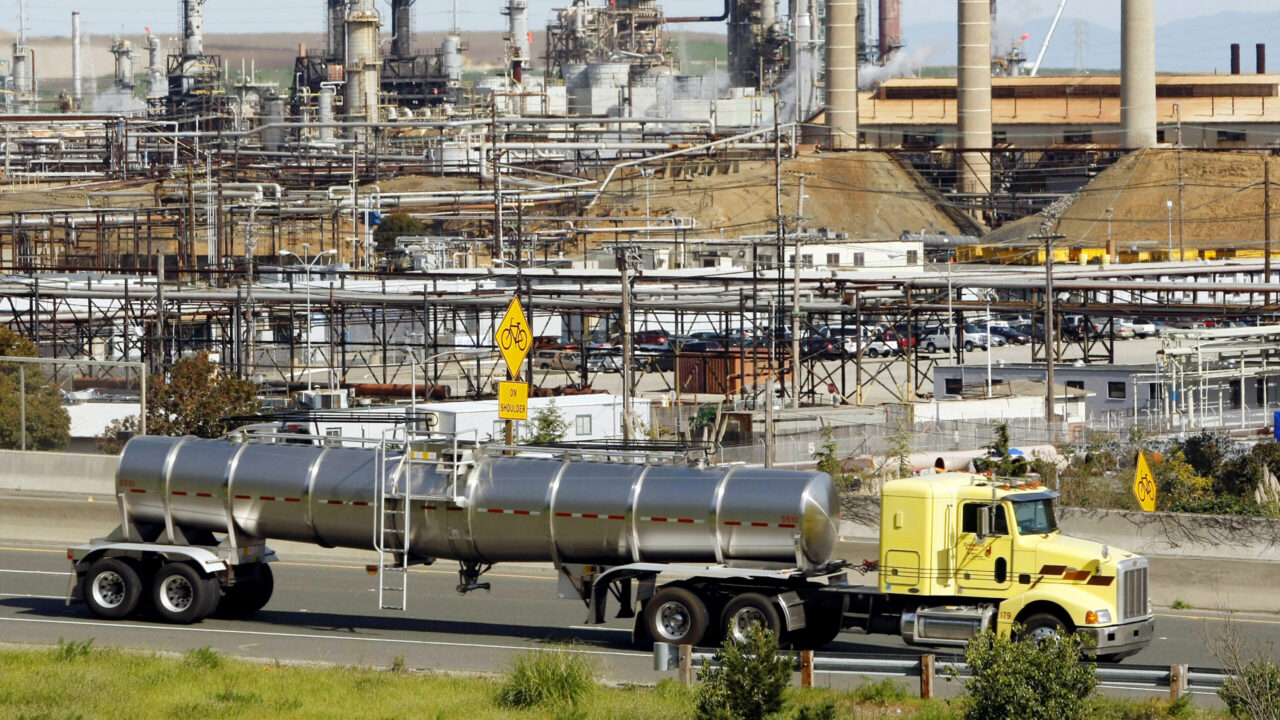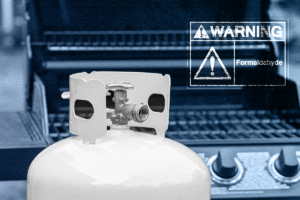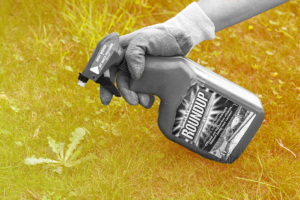One Mississippi Town Says No To Chevron’s Toxic Fuel
Chevron intends to produce “climate-friendly” fuel in the Magnolia State and cancer-wary locals are concerned. A tanker truck passes the Chevron oil refinery in Richmond, Calif., on March 9, 2010. (AP Photo/Paul Sakuma, File)
A tanker truck passes the Chevron oil refinery in Richmond, Calif., on March 9, 2010. (AP Photo/Paul Sakuma, File)
Chevron has petitioned the Environmental Protection Agency to approve its use of “climate-friendly” fuel made from plastic waste through a process called pyrolysis. Despite the agency’s own sky-high cancer risk assessments—estimating that every person exposed to air pollution from burning pyrolysis-based boat fuel over a lifetime would develop cancer—the EPA authorized Chevron to produce the fuel at its Pascagoula, Mississippi, refinery.
Residents took notice; now they’re embroiled in a lawsuit against the EPA and a campaign to relocate the city.
Leah Burks, who has lived in Pascagoula for the past 14 years, said she wasn’t contacted by the EPA or Chevron about the potentially carcinogenic fuel that would be made just miles from her home. Instead, she heard about the authorization through a network of highly engaged neighbors: Cherokee Concerned Citizens.
Residents of the Cherokee subdivision formed the group in 2013 after they realized they had been experiencing what they believed to be health effects caused by industrial pollution. The neighborhood is just a 10-minute drive from the Chevron Pascagoula Refinery, and within a 5-mile radius of seven other large industrial facilities.
“Honestly, we stay sick,” Burks told Prism. “People will probably dismiss it as something common, but it isn’t.”
According to Cherokee Concerned Citizens, 23 people in the 130-household subdivision have died of cancer or heart and lung issues in the last five years. ProPublica reporting identified Pascagoula as a hot spot for toxic air pollution. More than a third of Pascagoula residents are Black, and an estimated 24% live in poverty—more than twice the national average.
Leah Burks, who has lived in Pascagoula for the past 14 years, said she wasn’t contacted by the EPA or Chevron about the potentially carcinogenic fuel that would be made just miles from her home.
Artis Burney is a grassroots organizer in Ocean Springs, Mississippi, and he first learned about the plastic-based chemicals from Cherokee Concerned Citizens as well. Burney said he’s seen firsthand the toll pollution has taken on his community’s health. Several people in his life have cancer, including his mother who has bladder cancer and breast cancer.
“My best friend was diagnosed with colon cancer at age 22,” Burney said. “He got his colostomy bag whenever he was 24. We’re 46 now. Our entire adult lives he’s had cancer.”
Burney said he believes he can trace his friend’s cancer back to a pond they swam in as children; according to Burney, that water turned out to be a dump site for the local energy companies.
Burks told Prism she thinks the new chemicals approved by the EPA will exacerbate the existing health issues in the area.
One way local organizers are fighting the threat of pollution is by suing the governmental body charged with protecting them from it. In August, the nonprofit environmental law organization Earthjustice announced that Cherokee Concerned Citizens was challenging the EPA’s authorization by suing the agency. The suit alleges that the EPA approved the new chemicals without requiring lab tests despite knowing that “the resulting air pollution would pose a cancer risk 250,000 times greater than what the agency typically considers unreasonable.”
An investigation conducted by ProPublica found that, based on the EPA’s figures, every person exposed to a boat fuel ingredient made from plastic waste would be expected to develop cancer.
Despite the EPA noting in its consent order that a pyrolysis-based jet fuel produced at the factory poses a 1 in 4 cancer risk for lifetime exposure, the agency’s risk assessment revealed that the boat fuel ingredient’s far-higher risk was not included in the order. The EPA also claimed that it had overstated the cancer risks in its own assessment, and a Chevron fact sheet said the risk screening was “taken out of context.” A letter from the EPA to Sen. Jeff Merkley—who had criticized the approval of these chemicals—stated that the agency’s 1 in 4 cancer risk assessment wouldn’t apply to those living near the refinery. Instead, those who face the highest risk would be anyone nearby idling planes or boats that use the fuels. However, in the same ProPublica story, the EPA also admitted to mislabeling critical information about the harmful emissions.
Barbara Weckesser, the co-founder of Cherokee Concerned Citizens, said residents can’t tolerate the pollution anymore.
“The residents in our community are already at a higher risk of developing health problems because of all the industry polluting our neighborhood,” Weckesser said in a press release about the lawsuit. “The EPA’s approval of Chevron’s ask is forcing us to fight, leave, or stay here and die.”
Even with the pending lawsuit, most residents of the Cherokee subdivision have set their eyes on a buyout.
“Environmental regulation and enforcement will not be enough to reduce the health risks associated with living so close to so many polluting facilities,” the Cherokee Concerned Citizens website reads.
The group is trying to meet with Pascagoula Mayor Jay Willis to get him to sign off on a buyout so that those living in the high-risk area can have the funds to move somewhere safer.
“This place honestly is just uninhabitable because of the toxins,” Burks said. “People may say, ‘Well, why don’t you just get out?’ Well, it’s not that simple. Where will we go? A lot of us are just barely making it, and then trying to find a home elsewhere comparable to where we live currently—that’s almost nearly impossible. Then you need to have funds to do it. So what we’re trying to do is get the community to get together with us [and] fight this.”
Meanwhile, Burney has been engaging with his community through information sessions and mutual aid. He is involved in several climate organizations, including Gulf South for a Green New Deal, U.S. Climate Action Network, and Arm in Arm for Climate.
“The EPA’s approval of Chevron’s ask is forcing us to fight, leave, or stay here and die.”
Burney participated in a bus tour across five counties in Mississippi in December 2022. Organizers educated residents about the pollutants being released from nearby power companies and which politicians were taking money from these companies. They also paid some people’s power bills to bring attention to the issue.
Burney is hoping to take the movement one step further by running for office against Mississippi state Sen. Jeremy England. He said getting involved in the legislature is vital to the movement.
”It’s cool if we have access to information; we have best practices and ideas to fix things,” Burney said about his Senate bid. “But that doesn’t really matter if we never have a chance to get into the community where it counts and implement those things.”
While the EPA has discussed the recycling of plastic waste into fuel as “climate-friendly,” data suggests that creating pyrolysis oil leads to higher greenhouse gas emissions than extracting crude oil from the ground.
Michael McKenzie, a community strategist for Taproot Earth and founder of the Resilience is Power Program, said this would only make things worse.
“Plastics burn-off is a false solution that is further adding to the climate crisis while compounding the environmental injustices impacting our brothers and sisters from the Mississippi region to Africa and other nations where BIPOC communities call home,” McKenzie told Prism. “For starters, we should immediately ban single-use plastic production and use to repair the harm to people and the planet.”
Burney echoed the sentiment that pyrolysis was a false solution.
“They’re counting on the fact that the general public is not informed enough,” he said. “Because it’s new, they think ‘new, better!’ But no, it’s not. It’s just a new way of doing the same old dirty stuff.”
Burney said he wants to see the elimination of fossil fuel extraction altogether. He compared the potential transition from fossil fuels to the evolution of music from cassettes to digital: “It’s a progression.”
Burks encouraged people to seek out more information about Cherokee Concerned Citizens’ efforts by engaging with them online, and Burney advised residents to identify their elected officials and what their track records are. He suggested pushing local and state governments to make things like solar batteries more accessible—while creating the infrastructure for solar energy is also extractive, he said it’s at least a step in the right direction.
For now, Burks and her neighbors are petitioning the EPA to change course while pushing for the buyout that would let them relocate to somewhere safer.
“We just want out,” she said. “We can live the rest of our life—what’s left of it.”
Your support is crucial...As we navigate an uncertain 2025, with a new administration questioning press freedoms, the risks are clear: our ability to report freely is under threat.
Your tax-deductible donation enables us to dig deeper, delivering fearless investigative reporting and analysis that exposes the reality beneath the headlines — without compromise.
Now is the time to take action. Stand with our courageous journalists. Donate today to protect a free press, uphold democracy and uncover the stories that need to be told.






You need to be a supporter to comment.
There are currently no responses to this article.
Be the first to respond.